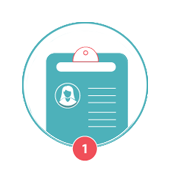Baseball is called the “National Pastime” of the United States because it is so popular. There are thirty teams spread across the country, and many people have their own favorite “home team.”
The game is played by two teams. When one team is in the field, the other team takes turns at bat. A baseball player first bats at the ball and then runs around the bases in an effort to score. Points, called “runs,” are scored when a player on the batting team touches all the bases (including home plate) without being tagged or put “out” by a player on the fielding team. The team scoring the greater number of runs in nine “innings” wins the game. Each inning is divided into two halves: top and bottom. Both teams are allowed three outs per half inning.
The Team
There are 9 men on a team: pitcher, catcher, first baseman, second baseman, third baseman, shortstop, left fielder, center fielder and right fielder. All the team members take a turn at bat, except for the pitcher, who does not bat on some teams.
The Diamond
The diamond, or “infield,” is named for its diamond shape. This area has a base at each corner. Runners move counterclockwise around the bases, starting from “home plate” (also called “home base”).
Each play starts at the “pitcher’s mound” in the center of the diamond. When the pitcher throws the ball, he must have one foot on the white rubber plate on the pitcher’s mound. The catcher crouches behind the batter at home plate. The “outfield” is the area beyond the infield – outside the “baseline,” the area where the batters run from one base to the next, and inside the “foul lines.” Foul lines define the area that is okay to play in. A “fair” ball is a ball that stays inside the foul lines. A batted ball that lands outside fair territory or touches fair ground, but rolls outside the foul line before reaching first or third base is a “foul ball.”
The Rules
Each batter tries to reach first base safely, then advance around the other bases and score a run.
A batter can be out in any one of three ways:
- He hits a ball but the fielder catches it before it touches the ground (“flyball”).
- He hits a ball on the ground that a fielder picks up and throws to first base before the batter touches that base
- He “strikes out,” meaning he swings the bat and misses the ball three times.
A base runner makes an out in one of five ways:
- A fielder tags him with the ball while he is not touching base
- He runs out of the base line to avoid being tagged
- A fly ball is caught and thrown to the base he left before he can get back
- He is hit by a batted ball
- He is forced to advance to the next base by the next runner (there can only be one runner on a base at a time) but he does not reach the base before the fielder tags it while holding the ball
Each team bats until it makes three outs. An inning has been played when each team makes three outs.
The batter stands in the “batter’s box,” one of the rectangles marked on each side of home plate. If he does not swing the bat at a pitch, the “umpire” (like an official or referee) calls it either a “ball” or a “strike.” A ball is when the pitched ball does not cross home plate between the batter’s armpits and the top of his knees. A strike would be when the ball does cross home plate between the batter’s armpits and the top of his knees. A ball hit into the foul area counts as a strike, unless there are already two strikes; in this case, the player continues to bat. If the pitcher throws four balls to one batter, then the batter can “walk,” meaning he can go to first base without hitting the ball.
The batter runs as far as he can when he gets a “hit.” He hits a single if he stops at first base, a double if he reaches second base, and a triple if he runs to third base. A “home run” or “homer” is when the batter makes it around all the bases to home plate without being out. In many baseball parks a fence encloses the outfield. It is an automatic homer when the ball is hit over this fence on a fly. A home run scores one run for the batter and a run for each player on base. If the bases are “loaded” (a player on first, second and third base) and the batter gets a home run, it is called a “grand slam,” the team gets four runs, and the fans get very excited because it doesn’t happen very often.
Leagues
Each team is part of a league. There are two leagues, the American League and the National League. Each team tries to win the most games in their league. The teams that win each league championship will play each other in the “World Series.”
Youth baseball
There are minor differences in the rules and there are fewer innings, but the game is basically the same.
Au Pair in America wants to celebrate you – the participants in our program who make it a success!
“Celebration Awards” are special recognition awards given to those who have shown a true commitment to the spirit and mission of the Au Pair in America program. Awards can go to host families, au pairs, community counselors, or anyone involved in the Au Pair program. Nominations can be made by any of the above!
“Celebration Awards” offer a chance for individuals to be recognized for outstanding performance in the areas of childcare, character, relationship as a family member, cross cultural understanding, personal growth and commitment to the program as a whole.
If you would like to nominate someone for an award, simply fill out and submit the nomination form linked below. Nominations are reviewed to ensure the nominees are in good standing. Au pairs will receive their “Celebration Awards” at cluster meetings, while all others will receive theirs via mail with a letter explaining the award.
Nominate someone who goes above and beyond! It’s a great way for them to know they are being acknowledged and appreciated!
Almost everyone experiences culture shock when they come to a completely new environment. Everything is different: the language, the food, the plumbing, the people.
The experience of culture shock comes from not knowing what to do or how to do things in a new environment, and not knowing what is appropriate or inappropriate.
One of the most difficult parts of experiencing culture shock is that we often are unaware that we’re affected. We recognize that we are sad, lonely, and generally irritated that everything is going wrong, but we don’t know that it is a normal reaction to being immersed in a new culture. The feeling of culture shock generally sets in after the first few weeks of coming to a new place.
Some telltale signs of culture shock are:
- Preoccupation with minor physical discomforts
- Anger over minor frustrations
- A desire to go back home
- Disturbed sleep patterns – too much or too little
- Changes in mood or behavior such as anger, irritability, resentment, or a persistent preference to be alone
- Idealizing your home country
- Inability to solve simple problems
- Lack of confidence
- Feelings of being lost, overlooked, exploited or abused
Immunity to culture shock does not necessarily come from being open-minded or full of good will (essential characteristics for a successful au pair), though these qualities do help with a speedy recovery. Some people are affected by culture shock more than others, but most au pairs go through an attack of it and then make a full recovery.
Although one can experience discomfort from culture shock, it is also an opportunity for learning and acquiring new perspectives. Culture shock can help develop a greater understanding of self.
Here are the usual stages:
First Stage: You may feel terrific. You know enough English to get along, the places are interesting, the people are kind, and it is clear that a wonderful experience is at hand. This time is called the “honeymoon” stage, as everything encountered is new and exciting. You may notice that other au pairs who have been here longer tend to complain. You may feel a bit superior to your peers who obviously did not make as good an adjustment as you have.
Second Stage: You may be sensitive to otherwise minor problems in daily life. In this stage, there may be feelings of discontent, impatience, anger, sadness, and feeling incompetent. You are no longer an interesting foreign visitor, but a regular member of the family, and you may feel ignored or taken for granted. At this stage when au pairs get together, they often criticize Americans, saying that heir host parents are always busy and that the children have bad manners, have too many toys and are difficult to control. This is the hardest phase of culture shock.
Third Stage: You regain your sense of humor and enjoy your mastery of American language, customs and cultures. You may not like everything about the country, but you’ve found enough things to enjoy and learned to live with the rest. You begin to realize that a year is a very short time and that there are so many things you want to do while you’re here. You may start to establish new goals.
TheFourth Stage is reverse culture shock. This occurs when you return to your home country. You may find that things are no longer the same as you remember. Or you may find that nothing but you has changed. You will have grown during your stay in the U.S., and you may find that your friends and family are just the same as they were when you left. They may be unable to understand the new you.
How to Reduce and Cope with Culture Shock
Some ways to combat stress produced by living in a new environment are:
- Take a class, develop a hobby.
- Be patient, becoming accustomed to the US will take time.
- Include a regular form of physical activity in your routine. Exercise such as taking a walk, going for a swim or enrolling in a yoga or aerobics class will all help.
- Relaxation and meditation are proven to be very positive for people who are passing through periods of stress.
- Maintain contact with people from your own country. This will give you a feeling of belonging, and you will reduce your feelings of loneliness and alienation.
- Seek out opportunities to interact with Americans. This will help you to learn English more quickly and adjust to cultural differences more easily.
- Volunteer in community activities. This will help you feel less stress about language and useful at the same time.
- Spend time with au pairs from other countries. This will give you a more global view of the world, let you find out how you are all experiencing being in the U.S., and put cultural differences into perspective.
- Focus your power on getting through the transition.
- Pay attention to relationships with your host parents and your new friends. They will serve as support for you in difficult times.
- Establish simple goals and evaluate your progress.
- Find ways to live with the things that don’t satisfy you 100%.
- Maintain confidence in yourself. Follow your ambitions and continue your plans for the future.
- If you feel stressed, ask your counselor for help.
American Road Signs
Test your knowledge of American road signs with this fun online game: https://www.quia.com/quiz/714247.html
How to Get a U.S. State License
Au Pair in America requires every au pair to have a valid home country driver’s license in order to participate in the program. Au Pair in America also requests that every au pair obtain an International Driving Permit (IDP). If you are allowed to drive on your home country license in the state you are living in, you must carry both your home country license and your IDP at all times. As legal IDPs are only available in your home country, if you have arrived in the U.S. without an IDP and your home country license is in a language other than English, you must carry an official translation of your home country license with you. Your home country license, along with an IDP or English translation of your home country license, may be sufficient for you to drive legally in the U.S. when you first arrive. Please confirm this with your host family and/or the local Department of Motor Vehicles (DMV). However, Au Pair in America strongly recommends that you obtain a local state driver’s license as soon as possible. Requirements and testing procedures vary from state to state. To find the requirements for your state, follow the link to the DMV for your state. Start by clicking here.
Winter Driving Tips
You are likely to find ice and snow on the roads in many parts of the country. There are some basic rules to remember to stay safe in the car in difficult driving conditions:
- Start early and take your time.
- Accelerate slowly, especially on hills.
- Drive slowly to avoid having to stop while going up a hill, as it will be hard to start again.
- Don’t make any sudden turns or stops.
- Be sure that the mirrors and windows are always free of snow and ice.
- If you skid, try to steer in the direction the car is sliding to regain control.
- The changes in temperature sometimes cause potholes in the streets. If you don’t see the pothole in time to steer around it, apply the brakes before hitting the pothole and release them just before you reach the pothole. If you keep the brake on as you hit the pothole, it will do more damage to the tire.
- Try to keep your gas tank at least half full.
- If your wheels spin on ice, switch to low gear, even on automatics.
- Leave extra space between you and the car in front of you.
- Remember that bridges and exit ramps are icier than roads.
- Ask what kind of brakes your car has and how to use them in case of a skid.
Wet Weather Driving Tips (from www.AAA.com)
- Summer rainstorms can quickly reduce visibility and create dangerous driving conditions.
- In stormy conditions, it is more difficult to see other vehicles, road signs and the road itself. It is critical that motorists take steps so they can see and be seen.
- Drivers should regularly clean their windshield and windows, on both the inside and outside. Drivers who smoke should take extra care to make sure their interior windows are clear of a buildup of smoke residue.
- AAA also suggests that motorists regularly check that headlights, taillights, brake lights and turn signals are working properly.
- As soon as rain begins, AAA recommends drivers turn on headlights and windshield wipers. Many states require headlights to be turned on when it is raining or if the visibility is reduced to less than 500 feet.
- When visibility is so limited that the edges of the road or other vehicles cannot be seen at a safe distance, it is time to pull over and wait for the rain to ease up. It is best to stop at a rest area or other protected location. If the roadside is your only option, AAA recommends pulling off as far as possible, preferably past the end of a guardrail. Keep headlights on and turn on emergency flashers to alert other drivers.
- In addition to reducing visibility, rain creates slippery roads that require motorists to use extra caution. AAA suggests that when driving in rain, motorists slow down and increase the distance between vehicles to compensate for reduced tire traction.
Car Safety Kit
Recommended items to have in the car in case of emergency:
- Jumper Cables (these can be unsafe if used improperly, so be sure you know how to use them)
- Flashlight
- Flares
- Reflective triangles
- Bag of sand or kitty litter (to help if stuck in ice, snow)
- Small shovel (for snow)
- Extra windshield solvent
- Blankets and extra clothing
- Nonperishable food items and water (e.g.. snack bars)
- Cell phone (do not use a cell phone while you are putting gas in the car; it can start a fire)
- List of emergency telephone numbers on a card in the glove compartment (if you are a member of AAA, list that info too)
- Snow brush and ice scraper
Freeway and Highway Driving Safety
Entering, exiting and traveling along a freeway or highway requires different driving skills than driving in town.
A football field is 100 yards long. The line dividing the field in the center is the 50 Yard Line. There are other lines marking the field off into 5 yard sections. There is a Goal Post at each end of the field, in the End Zone, one for each team.
Each team has an Offense and a Defense. When the Offense of one team is on the field, the Defense of the other team is on the field. The Offense has the ball and tries to score by getting it across the Goal Line – the line where the playing field and the End Zone meet. The Defense tries to stop them.
The Offense gets four tries to move the ball 10 yards toward their own goal post. These are called Downs. If they make the 10 yards or more, they get another four tries to move the ball another 10 yards. If they don’t move the ball 10 yards in four tries, the ball goes to the other team, or the team “loses the ball.”
When a team loses the ball, their Offense leaves the field and is replaced by their Defense. The other team’s Defense leaves the field and is replaced by their Offense.
Play is started by the Offense and Defense lining up facing each other. The Offense faces the direction of their Goal Post. The Quarterback passes (throws) the ball to one of his team mates. If he catches it, he runs toward the End Zone. If he makes it across the Goal Line, his team scores a Touchdown and gets six points. The team then gets a chance to earn an extra point by kicking the ball through the Goal Posts or two points by passing or running the ball into the End Zone.
If the team mate catches the ball, the Defense runs after him and tries to tackle him (grabbing him and causing him to fall to the ground). If he is tackled, play starts again at that point where the ball is. If the team mate doesn’t catch the pass, the ball is dead and goes back to the previous starting place.
Sometimes a player of the Defense catches the pass. That’s called an Interception. He then runs toward his team’s goal and may score a Touchdown for his team. If he intercepts the ball, the other team’s players will try to tackle him. Even if he is tackled, his team now has possession of the ball. His team’s Defense leaves the field, replaced by their Offense. The other teams Offense leaves the field, replaced by their Defense.
A Football Game is made up of 60 minutes of play time. The 60 minutes is divided into four Quarters of 15 minutes each. At the end of two Quarters, there is a break called Half Time. On the Scoreboard you can see the minutes and seconds running out. The team with the most points at the end of four Quarters wins.
The Super Bowl is the final game of the Football season when two teams play each other for the championship. The game takes place in late January or early February. For some people the TV commercials are the best part of the Super Bowl.
Guidelines for Eating Smart
- Eat breakfast – it’s the best way to start the day.
- Drink water – 4 glasses or more a day, more when it is hot or when you are active.
- Downsize your portions – how much you eat is as important as what you eat.
- Snacking – most packaged snacks are high in calories and low in nutrition. Skip the cookies and the chips and snack instead on whole fruits, nuts, popcorn (without the butter), carrots or non-fat yogurt.
- Fiber – foods rich in fiber are filling and give you energy. These foods include bran cereal, fresh and dried fruit, broccoli, asparagus, peas, corn, cabbage, brussels sprouts, whole grain breads, brown rice and lentils.
- Lean protein – whether or not you eat meat, you need protein. Best sources include skinless chicken or turkey breast, fish and shellfish, egg whites, lowfat milk and cheese, kidney beans, chick peas, tofu and other soy products.
- Variety – try to eat fruits and vegetables of many different colors. This will help you get many vitamins and other nutrients important to your health.
- Stop eating before you are full – you’ll feel better.
If you want to lose weight, here are some ideas to help you do that:
- Eat breakfast – it’s the best way to start the day.
- Crash diets or quick weight-loss schemes are not a good long-term solution.
- Have patience in losing a half-pound to one pound per week.
- Always drink plenty of water or other fluids.
- Never skip meals in an effort to lose weight.
- Get up and go, increase your physical activity.
- Eat a variety of foods.
Credits: The International Food Information Council Foundation and https://www.bluecrossma.com
Stay in touch with your Community Counselor
- Call if you cannot come to a monthly meeting.
- Let your counselor know if you will be out of town.
- Call when you need help or advice.
Be a good buddy
- Remember what it is like to be a new au pair. Welcome new arrivals.
- Arrange to meet a new au pair.
- Take her out.
- Accompany her to the next cluster meeting.
Take responsibility for your actions
- No one is perfect. If you make a mistake, take responsibility and try to correct the situation.
Respect the privacy of others
- Gossiping about other au pairs and host families can be very harmful.
- If your friends confide in you, honor the confidence.
- Do not tell others about what goes on in other host families.
Communicate
- Share your ideas, discuss cultural differences, ask questions when you don’t understand.
- If you have a problem, present it to your host parents clearly and calmly. Suggest a solution to the situation. Listen to what they say and try to reach a compromise.
- Let your host family know if language is a problem. Admit if you do not understand a word or instructions. Ask questions.
Follow house rules
- The only way you will establish trust is by following rules – even those with which you may not agree. If you are not sure of the house rule, ask.
Be considerate of your host parents
- Keep them informed of where you are going.
- Let them know if you are staying out overnight.
- If you plan on traveling, discuss the details with them and do not interfere with their schedules. Remember that your host parents are tired when they get home from work.
- Show appreciation – return the favors your family does for you with kindness and generosity.
- Take initiative – don’t wait to be asked, anticipate children’s needs, offer to help when you are sharing “family time.”
Set a good example
- The children you care for look up to you. Don’t do things in front of the children that their parents would not want them doing.
Shower or bathe regularly
- Most Americans value cleanliness as a virtue. Families expect that their au pairs will bathe or shower regularly, wash hair frequently and change into clean clothes daily. Use deodorant.
Take care of yourself
- Have reasonable expectations of yourself – be patient as you learn to adjust to life in America.
- Try to understand and accept cultural differences – that is part of why you came here. Learn from the experience.
- If you are feeling homesick or house-bound, call someone and give yourself something to look forward to.
- Keep reasonable evening hours if you are expected to get up early to work the next day.
Slang
Americans use all kinds of idioms, expressions, sayings and slang. Here are some sites to help you understand what people are saying.
This site offers a detailed list of expressions and idioms organized in different ways to help you find what you want: https://www.idioms.myjewelz.com/
Still can’t understand? For specific individual slang words, try this site. The quiz format will help you understand and speak like a native: https://www.manythings.org/slang/slang2.html
Translation
If you need a translation try these free on-line translation services:
WordLingo: https://www.worldlingo.com/en/products_services/worldlingo_translator.html
Babel Fish: https://www.babelfish.com/
Date Rape Drug
“Roofie” is a sedative that is extremely dangerous, especially when combined with alcohol, causing blackouts and even death. Au pairs have been victims in the past. To avoid becoming a victim:
- Don’t go to bars or parties alone
- Take your drink directly from the bartender
- Don’t share or exchange drinks
- Never leave your drink unattended
- If you feel very drink after 1 or 2 drinks, get help
- Never leave with someone you just met
Drinking Age: It’s the Law!
As you know, it is illegal to buy or drink alcohol (including beer and wine) in the United States if you are under 21 years of age. If someone buys alcohol for others who are under 21, it is the person who is buying the alcohol who will be in trouble with the law. It is not a chance worth taking. Do not put your friends into an embarrassing or dangerous position by asking them to buy alcohol for you if you are under 21!
Street Safety:
Common sense, alertness and a few basic precautions are the key to remaining safe around town or when you are traveling.
What follows are some basic guidelines for you to review:
- If you are walking at night, stay on well-lighted, busy streets; keeping a safe distance from shrubs, dark doorways and alleys.
- Walk with a friend whenever possible.
- Keep your car locked and check the back seat before you get in.
- Remember that visible cash or expensive jewelry can be a temptation.
- If you are in an unfamiliar neighborhood, look around for open stores, public telephones and street lights.
- If you think someone is following you, change directions and walk toward a restaurant, store or home that has lights on.
- Carry your car key or your house key in your hand as you approach the door.
- If you feel that you are really in danger, SCREAM.
- If you think someone is following your car, do not head home. Instead, find a police or fire station, a gas station or other open business where you can get help.
- If you are on an elevator and someone suspicious gets on, get off. Never get in an elevator with someone you don’t feel comfortable with.
- When you meet someone new, do not give out your phone number or address. Get his phone number instead.
- If you plan on meeting someone, do it in a public place with at least one friend to avoid being outnumbered.
- Never get in a car (yours or theirs) with people you have just met.
- Always notify your host family if you are planning on spending the night elsewhere.
- Remember that alcohol can affect your judgment.
- If you become a victim, try to get an accurate description of your attacker. Report the incident to your counselor, your host family and the police.
Remember the THREE BASIC RULES of safety no matter where you are:
- Stay alert. Keep your mind on your surroundings and who is around you.
- Communicate the message that you’re calm, confident, and know where you are going. Stand tall, and walk purposefully.
- Trust your instincts. If you feel uncomfortable in a place or situation, leave.
It is possible to wire money internationally from most banks in the U.S.
You can also choose to use one of these two popular services:
- Money Gram International: https://www.moneygram.com/
- Western Union: https://www.westernunion.com/
The fees are different, so you may want to compare the cost before choosing a service!
- Do NOT use the phone or computer during working hours.
- Keep personal information confidential. Don’t give out your name, age, phone number or address. This warning applies to chat rooms, contests and online clubs.
- Do not post photographs of your host family or of yourself.
- Don’t believe everything you read or see online.
- If you find something online that makes you feel uncomfortable, do not return to that site.
- If you meet someone online who wants to meet you in person, do not ever agree to meet him or her except in a public place, and try to go with a friend.
- Remember that someone other than you can view any email you send or receive, and know what sites you have visited. Nothing on the computer is truly private!
- Downloading from websites and opening email attachments can infect your computer with a virus. If you are visiting an unknown site, do not download any files.
- Don’t reply to junk emails (spam).
- Make sure that anything you put in an email is something that you are comfortable having other people see. Your email might be forwarded without your knowing it.
- Think before you buy. If the online advertisement or junk email offer sounds too good to be true, it probably is!
















